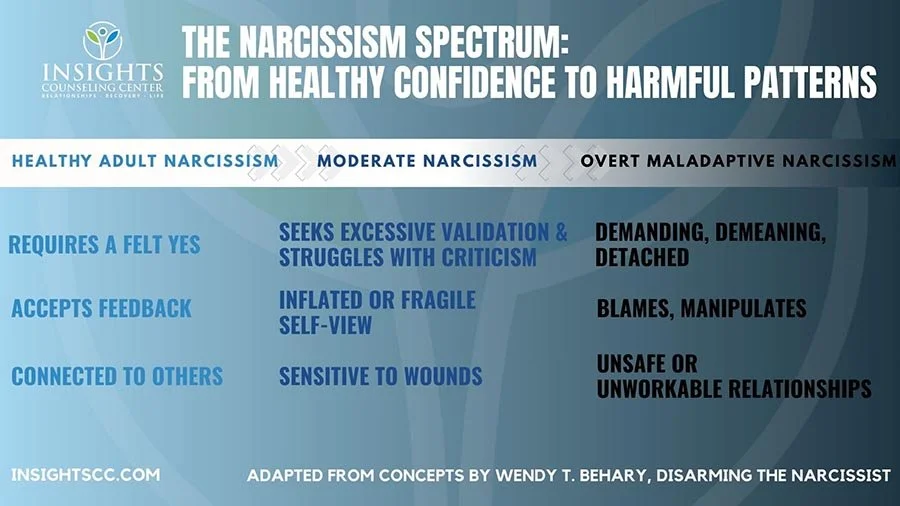Is the Difficult Person in Your Life a Narcissist? Understanding the Spectrum of Narcissism
Not every difficult person in our lives is a narcissist—but when narcissism is at play, it can deeply affect how safe, seen, and connected we feel in our closest relationships. Whether you’re wondering if you're facing a milder form of narcissism or something more extreme, understanding the spectrum can help you make clearer, healthier decisions.
Healthy Adult Narcissism: The Best of Strength and Self-Confidence
First, let’s talk about the healthiest end of the spectrum: healthy adult narcissism.
This is the kind of self-assurance and persistence we admire in leaders, artists, healers, and even close friends who inspire us. Someone with healthy adult narcissism has a realistic sense of self-worth. They can accept praise and criticism, stay motivated through setbacks, advocate for themselves when needed, and still stay attuned to others. They aren’t perfect—and they don’t expect to be—but they know they have value, and they recognize the value in others too.
Healthy adult narcissism can develop through loving upbringing, personal growth, therapy, or even hard-won healing after difficult early experiences. These individuals may be persistent and confident in pursuing their goals, but they don’t bulldoze others in the process.
They have a solid sense of self without losing their sense of others.
Moderate Narcissism: When Confidence Begins to Strain Relationships
Moving further along the spectrum, we find moderate narcissism. Here, you may notice a person who needs a bit more admiration than usual or who struggles with feedback that doesn't match their self-image. They may sometimes act entitled, seek a lot of validation, or have difficulty tolerating emotional vulnerability.
However, in moderate cases, these traits show up some of the time rather than most of the time. The person might be teachable. They may be capable of hearing how their behavior affects others—even if it’s uncomfortable. With reflection and effort, these individuals can often soften defensive patterns and grow relationally.
Overt Maladaptive Narcissism: When It Becomes Harmful
At the most extreme end of the spectrum lies overt maladaptive narcissism. This is the version that disrupts not just individual relationships, but entire environments. It’s important to remember that for someone to fit this description, their traits must be excessive—showing up more often than not, not just occasionally.
The following traits, adapted from Wendy T. Behary’s Disarming the Narcissist, describe the common markers of overt maladaptive narcissism:
Self-Absorbed: Acts like everything revolves around them
Entitled: Makes and breaks rules without concern
Demeaning: Puts others down, bullies, or belittles
Demanding: Expects immediate gratification of their wants
Distrustful: Assumes others' kindness has hidden motives
Perfectionistic: Insists on rigid, unyielding standards
Snobbish: Believes themselves to be superior, easily bored
Approval Seeking: Craves constant admiration and recognition
Unempathic: Fails to recognize or care about others’ emotions
Unremorseful: Cannot genuinely apologize
Compulsive: Overfocused on minutiae or specific rituals
Addictive: Cannot let go of self-soothing but damaging behaviors
Emotionally Detached: Shuts down emotionally or avoids emotional connection altogether
If you recognize ten or more of these traits in someone close to you—and they are consistent, not occasional—you may be dealing with someone exhibiting overt maladaptive narcissism.
This form of narcissism is often what makes relationships feel unworkable, unsafe, or confusing. People with overt maladaptive narcissism typically resist change because acknowledging a need for change would threaten their fragile sense of superiority. Instead of relational repair, they often deflect, blame, minimize, or escalate conflict.
Why This Matters in Couples Therapy and Discernment Counseling
When you are living with (or trying to decide whether to stay with) someone displaying overt maladaptive narcissism, typical couples therapy models like the Gottman Method may need to be adjusted. These approaches rely heavily on a basic foundation of mutual goodwill—the belief that both partners are capable of empathy, growth, and compromise.
If one partner is consistently operating from an extreme narcissistic framework, traditional couples work can feel stalled or even harmful to the non-narcissistic partner.
Discernment counseling can be a powerful tool in these situations. It’s designed to help couples where one or both partners are uncertain about whether to stay together. It doesn’t assume both partners are equally ready or able to change. Instead, it focuses on clarity and honoring the reality of what’s possible.
"Confidence strengthens connection. Entitlement tears it apart."
A Spectrum, Not a Label
It’s important to remember: narcissism is a spectrum, not a label.
Someone with healthy adult narcissism isn’t arrogant—they’re confident. Someone with moderate narcissistic traits may still be capable of growth and empathy. But when traits become excessive, pervasive, and harmful, it’s important to name what’s happening—not to shame—but to protect your own well-being and make wise, informed decisions.
You don’t have to carry this alone. You don’t have to keep hoping it will get better if all the signs are telling you otherwise.
You Deserve a Relationship That Can Grow and Heal
If you’re struggling to know what’s possible in your relationship—or if you recognize signs of extreme narcissism and feel stuck—we are here to walk with you. We offer couples therapy, discernment counseling, and Gottman Method therapy to help you find clarity, healing, and a path forward.
Reach out today if you’d like support navigating the complicated emotions and decisions that come with loving—and protecting yourself from—a difficult partner.
Trait descriptions adapted from Wendy T. Behary, Disarming the Narcissist: Surviving and Thriving with the Self-Absorbed (New Harbinger Publications).

